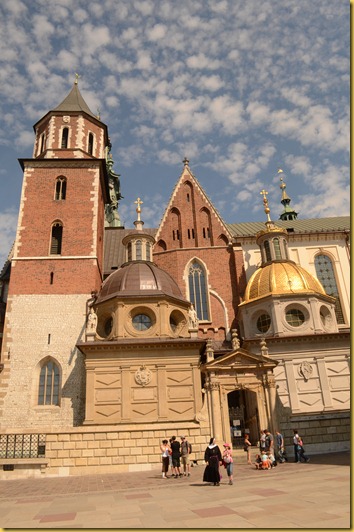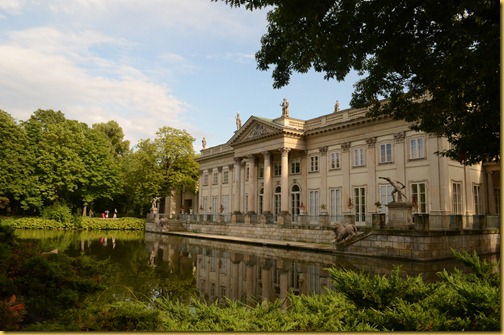
Poland is a country steeped in medieval castles and folk lore, of royal palaces and parks where legends and pagan myths vie with war time stories. We go on a tour of castles and palaces, visiting Wawel Hill in Krakow, the ancient capital and follow it to Warsaw the current capital where we will stop by Wilanow palace. And then we end our trail in the largest castle built in the world � the Malbork Castle.

We were cruising on the Vestula when I saw the beautiful Wawel Castle that stands as a landmark of Krakow in Poland. Sitting pretty atop a limestone outcrop called Wawel Hill, this has seen the rise and fall of many a dynasty .The hill itself maybe over 100 million years old and has been inhabited since the Palaeolithic Age . Today it houses a mosaic of monuments including the 1000 year old cathedral and the ancient castle

Castles are not just about battles fought and won, but about fairy tales too. Here is a battle too , between a mythical dragon that lived at the foot of the hill and was eventually killed by the Prince Krakus who founded the city. However in another version of the folklore, a local hero emerged in the story in the form of Skuba, a cobbler�s apprentice. The dragon had a penchant for young virgins and the king offered his daughter�s hand in marriage to the person who killed the dragon. Skuba stuffed a lamb with sulphur and left it as a bait below the dragon�s lair, who eventually exploded after eating it.

The medieval castle itself has been built and rebuilt several times, having survived wars and fires. It was constructed in the Gothic style in the 14th century, while Renaissance elements were added a couple of centuries later. Rich Flemish tapestries from the 16th century catch your eye as you walk around the many chambers inside the palace. Home to over three dynasties of the monarchs , the palace takes you on a whirlwind tour of Polish history.

The kings however were all crowned in this 1000 year old Gothic cathedral which tells a tale of its own. The first thing that you notice about the cathedral is the giant bones of a mammoth and a whale hanging at the entrance. A sign of Pagan worship or a reference to the dragon lore � one wouldn�t know for sure. And yet, in this cathedral which has every stamp of architectural style � from Gothic, Renaissance, Baroque to Classic , kings, saints and bishops lay buried in the crypts. Our guide tells us that it bears similarity to the �Murder in the Cathedral � story as a bishop was murdered here by a king. However, he is quick to add that Pope John Paul 11 offered his first mass as a priest here.

Our next port of halt is Warsaw the capital. Walking along the Castle Square in the charming old town, you get a different glimpse of the capital city. The royal castle stands in front of the square, its brick red fa�ade spread across the old town. Once upon a time it was the official residence of the royalty; today however it is a museum that tells the tales of destruction caused by the wars while the city has risen from the ashes like a Phoenix.

Warsaw is a city of palaces and castles with parks surrounding them . I am told that there are more than 30 of them in the city. We visit the 17th century baroque residence of the Polish monarch � the Wilanow Palace that is nestled in lush greenery . Paintings and sculptures adorn this beautiful palace which has changed hands several times between royalty and aristocracy and has eventually been destroyed during the World War 2 before being restored again

The royal residence was initially built as a Polish aristocratic mansion in a little village and it slowly became a magnificent structure with French styled palaces and Italian garden villas. Walk around and you can see the royal apartments , but the guides tell you that the interiors were changed over a period of time and the palace is now a veritable art gallery and a museum . Busts of kings and queens and Gods and deities were showcased here. The ceilings were elaborately painted with frescos , while the portrait galleries take you to the time of the Polish royalty.

Parks and lakes drape Warsaw into a city covered by lush fabric . We walked up the Lazienki Park , which translates to Royal Baths Park , where the gardens were landscaped in the 17th century in a typical Baroque style. A bathing pavilion lends its name to the park and palace here. Amidst the verdant greenery are beautiful palaces and castles , notably the �Palace on the Water � or �the Palace on the Island , also referred to as the �Lazienki Palace. � On the banks of the lake is a Roman amphitheatre and if you walk around the park, you will notice another palace called the Myslewicki Palace , a White House, Orangeries, temples to Diana and a Water Tower.

We finally end our trail as we leave Warsaw and enter the portals of the largest castle to be ever built in the world � the Malbork castle. As you see the castle standing across the Nogat , you learn that this was once a medieval fortress was built in the 14th century by the Teutonic Knights in what was then known as Prussia. Built in bricks, the World Heritage Site takes you into a fascinating journey of the knights and their stories.

The castle takes you into a different world. As you enter the portals, you see a courtyard and enter halls and rooms with old paintings . Although the castle was rebuilt after the World War 2, much of it was recreated to show how the medieval knights lived here. You walk around and see the kitchens, the mills, the large wells and even the restrooms sitting atop a moat with cabbage leaves serving as toilet paper .

The castle the largest Gothic monument in this part of the world and was named Marienburg or Malborg after the patron Saint Mary. There are three main castles built within the fortress and were strongly defended by the knights, who also controlled the trade of amber in this region. The Church of our Lady built inside the castle is still in ruins and it takes you back to the times of the past when the castle has been in siege .
This photo feature was published in Yahoo.
No comments:
Post a Comment